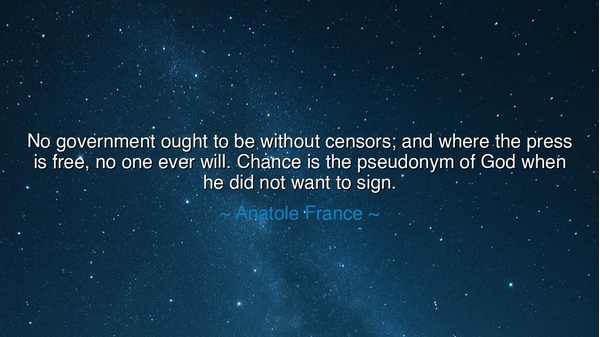
No government ought to be without censors; and where the press is
No government ought to be without censors; and where the press is free, no one ever will. Chance is the pseudonym of God when he did not want to sign.






In the vast theatre of human affairs, where power and freedom collide in a constant dance, there are forces at play that often shape the course of history in unseen ways. Anatole France, a thinker of profound depth, speaks to the nature of government, freedom, and the invisible hand that guides the events of the world when he says, “No government ought to be without censors; and where the press is free, no one ever will. Chance is the pseudonym of God when he did not want to sign.” These words offer a poignant reflection on the complex relationship between authority, expression, and the forces that shape our fate.
The first part of the quote speaks to the inevitable presence of censorship in governance. France understood that government cannot exist without the balancing act of control. In every age, those who wield power seek to protect it, and in doing so, they often control what is seen and heard. The ancient emperors of Rome knew this well; the edicts of Caesar Augustus sought not just to conquer lands but to control the very narrative of the empire. History was rewritten in favor of the powerful, and the voices of the oppressed or dissenting were silenced. Yet, this control was never absolute—there was always freedom in some form, the potential for truth to emerge through cracks in the system.
France’s words remind us that in a society with a free press, the censors of government face a powerful adversary—the truth. The press, the voice of the people, the lens through which history is recorded, cannot be easily silenced. Freedom of expression, the ability to speak truth to power, is a sacred trust in every civilization. Yet, it is not without its dangers, for those in power often find it a threat to their stability. In the ancient world, the philosophers like Socrates were silenced for daring to question the norms of society and the power structures that governed it. Yet, Socrates’ words, though buried by his enemies, have persisted, a testament to the enduring power of the spoken word and the free press.
As we move from the realm of censorship to that of chance, France’s insight deepens. “Chance is the pseudonym of God when he did not want to sign.” Here, chance takes on a deeper, more mysterious meaning. The randomness of the world, the seemingly arbitrary twists of fate, are but God’s way of remaining anonymous. It is as if, in his wisdom, God allows the course of events to unfold with the illusion of randomness, that we might still wrestle with the consequences of our actions, yet not fully understand the hand that guides them. Chance gives the appearance of freedom, yet behind it lies a design, a higher plan at work that we may not fully comprehend.
Consider the story of Julius Caesar, a man who, by all accounts, seemed to bend the world to his will. Yet, it was chance, in the form of a single betrayal by those closest to him, that ultimately sealed his fate. The Ides of March, when Caesar was assassinated, seemed at the time to be the result of a political struggle. Yet, in hindsight, it could be seen as part of the grand design of history. Caesar believed he controlled his destiny, but chance was the final arbiter. In this way, chance—the appearance of randomness—is often the invisible hand of fate, guiding events in ways that no one, not even the most powerful, can fully predict or control.
Thus, France calls us to recognize that chance is not purely the result of random occurrences, but a force shaped by divine will, acting in ways that remain hidden from human eyes. In our own lives, we often wrestle with the concept of chance—the moments when life’s course seems to be directed by unseen forces. We may feel as though we are at the mercy of circumstance, unable to control the events that shape our lives. Yet, France’s words suggest that in these moments, there is a deeper truth—that chance is the manifestation of a greater design, an unknown hand guiding us in ways we cannot comprehend.
The lesson here is clear: while government and power often seek to control, to suppress, or to shape the narrative, the truth finds a way to emerge, particularly when the press is free. In our own lives, when we face the chaos of chance, we must learn to see it not as an enemy, but as part of the grand design. In the face of adversity, when chance appears to be against us, we must understand that it may be a test of our resilience, or a path leading to greater wisdom. Like the ancient philosophers, we must embrace the uncertainty of life, for in uncertainty, we find our truest potential.
Thus, let us take France’s wisdom to heart: In the pursuit of truth, let us remain vigilant against the forces that seek to censor and control the flow of information. Let us cherish the freedom of expression, knowing that it is through honesty and openness that we grow. And when faced with the uncertainties of chance, let us not despair, but trust that in the unseen forces of the world, there lies a purpose greater than we can understand. Chance may seem to be random, but it is part of the grand tapestry of life, woven by a hand far wiser than our own.






AAdministratorAdministrator
Welcome, honored guests. Please leave a comment, we will respond soon